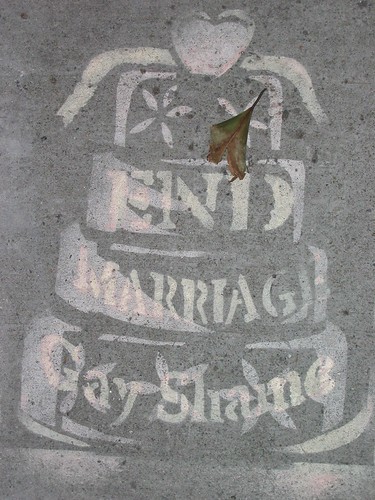It is hard to say if either side is truly winning this culture war. It's entirely possible for one of two (or several) opposing sides to dominate and "win." But in the case of same-sex marriage, new grounds seem to be taken every year by the proponents of changing the definition of "marriage." The mere fact that there are constitutional amendments proposed to ban same-sex marriage indicates that the subject is on the national consciousness, and that side of the culture war senses their domination challenged. If there was no challenge to the legal definition of marriage, it wouldn't be an issue at all. So the more debate and discourse that goes down, the more it begins to seem like marriage may in fact experience a makeover.

As a staunch supporter of full rights for same-sex couples, including the ability to legally define their relationship as a "marriage," I really wonder what I would have to hear to be swayed in the opposite direction. I don't even think that if I study came out saying, for instance, that same-sex marriages universally lead to divorce, my mind could be changed. I would likely still believe firmly that the couples in question should be granted the right to marry AND divorce in the same fashion as heterosexual couples. That is one argument that truly resonates with me - the assumption that same-sex marriages are inherently more doomed than their counterparts. In recent years, society has seen the "sanctity of marriage" trespassed upon by more than just the suggestion of men being able to marry men, women being able to marry women, etc. I strongly believe that if advocates of same-sex marriage can convince the public that these unions are truly no more or less functional than traditional marriages, their fight may be successful. As far as policy is concerned, I think it will ultimately be very hard to enact anything that won't favor the moral fortitude of one side or the other. The middle ground essentially betrays them both, settling for a milquetoast version of both sides at once. All policy has to concede that some people will not be happy with the outcome. Personally, I believe that because it is so impossible to please everyone in this subject matter, the next best option is to make it possible that people are free to make their own decision to marry the person of their choice (within the other parameters of the law). At least that way there is not a full-fledged denial of rights and equality, something that is a stronger foundation for this country than a traditional marriage structure alone.
So what does this have to do with public space? The dialogues used in our readings are reminiscent of the dialogues brought up in the discourse on public space, graffiti and urban neighborhoods. This idea of the presence of one side essentially corrupting the other on a fundamental basis is a theme found throughout the culture wars, not just in controversial political debates such as this one. With gentrification running rampant in communities like Columbia Heights, Petworth, Mount Pleasant and more, opponents argue for the sanctity of their neighborhoods while the people creating the changes root for the ability to develop and grow whereever they see capital. The fundamental basis of graffiti and this idea of creating a personal message out of community space directly opposes the moral sanctity of anti-vandalism laws. The importance and value of tailoring urban landscapes to the people who live within them and have charged emotions and messages for them butts heads with lawmakers keen on creating a space that remains unoffensive to everyone, regardless of politics. Should public space be neutral territory or a blank canvas?